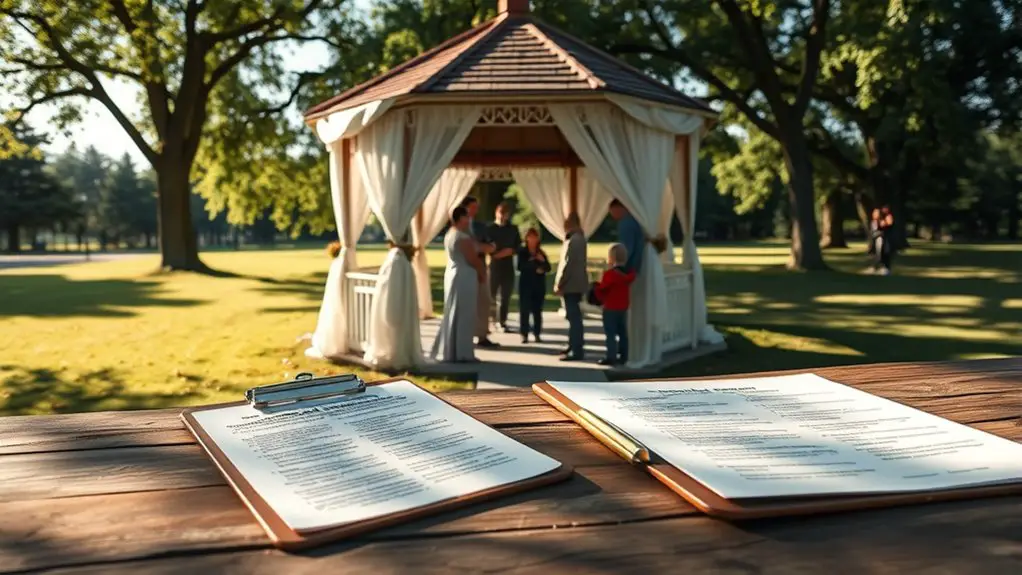When renting a gazebo for your event, you need to take into account several legal issues. First, understand liability concerns to limit responsibility for injuries or damages. Familiarize yourself with local zoning regulations, as they can affect event plans. Don’t forget to secure any required permits to avoid potential fines. Finally, investing in liability insurance can provide peace of mind and cover unexpected incidents. There’s more to know about making your rental experience seamless.
Understanding Liability Concerns
When renting a gazebo, understanding liability concerns is essential for both renters and property owners. You’ll want to contemplate liability waivers to protect yourself from potential legal claims. These waivers can limit your responsibility for injuries or damages that might occur during the event. It’s also wise to look into event insurance, which can provide further coverage for unforeseen incidents. This insurance can safeguard against accidents, property damage, and other liabilities, ensuring peace of mind. By addressing these concerns proactively, you can enjoy your event without worrying about legal repercussions. Engaging with both liability waivers and event insurance not only protects you but also fosters a responsible rental environment, ultimately allowing for a more enjoyable and worry-free experience.
Navigating Local Zoning Regulations
Before renting a gazebo, it’s essential to familiarize yourself with local zoning regulations, as these laws can greatly impact your plans. Understanding zoning classifications and property restrictions can save you from potential headaches. Here’s what you need to evaluate:
- Zoning Classifications: Identify if your event location falls under residential, commercial, or mixed-use zones, as each has distinct rules.
- Property Restrictions: Check for any limitations on structures, such as height or size, that may affect gazebo installation.
- Event Limitations: Be aware of restrictions on noise, hours of operation, and guest capacity, which can influence your event’s success.
Required Permits for Gazebo Rentals
Understanding the required permits for renting a gazebo is essential to guarantee compliance with local laws and regulations. Before you finalize your rental agreements, you’ll need to submit a permit application to your local authorities. This application typically requires details about the event, including the date, duration, and purpose.
Failure to secure the necessary permits can lead to fines, forced cancellations, or other legal complications, which can dampen your event’s spirit. It’s vital to check with your local government or park services to understand specific requirements, as these can vary greatly. By ensuring you have the required permits in place, you’re not just following the law; you’re also ensuring a smooth and enjoyable experience for everyone involved. Additionally, it’s important to be aware of local regulations that may impact your gazebo rental and event planning.
The Importance of Liability Insurance
Liability insurance acts as an essential safety net for anyone renting a gazebo, protecting against potential legal claims arising from accidents or injuries. Without proper liability coverage, you could face significant financial risks. Here are three key reasons to take into account insurance policies:
- Accident Protection: If a guest is injured on your property, liability insurance can cover medical expenses and legal fees.
- Property Damage: In case of damage to the gazebo or surrounding area, liability coverage can help mitigate repair costs.
- Peace of Mind: Knowing you’re protected allows you to focus on enjoying your event without worrying about unforeseen incidents.
Ultimately, investing in liability insurance is a vital step in ensuring a smooth and carefree experience when renting a gazebo.
Tips for a Smooth Rental Experience
When planning your event, keeping a few key tips in mind can help guarantee a smooth rental experience for your gazebo. First, thoroughly review the rental agreements before signing. Confirm you understand all terms, including cancellation policies and any additional fees. Next, inquire about gazebo maintenance; it’s crucial to verify that the structure is in excellent condition before your event. Communicate any specific needs or concerns with the rental company ahead of time, as this can prevent misunderstandings later. Additionally, plan for weather contingencies to protect your guests and the gazebo itself. Finally, inspect the gazebo upon delivery to confirm it meets your expectations. By following these steps, you’ll set the stage for a successful event. Additionally, ensure that the gazebo provides adequate shade and shelter for your guests, enhancing their comfort throughout your gathering.
Frequently Asked Questions
What Types of Events Are Allowed in Rented Gazebos?
When you’re considering renting a gazebo, envision it as a canvas for joy. Wedding receptions and birthday parties often flourish in such spaces, allowing you to celebrate life’s milestones amidst nature’s embrace without unnecessary constraints.
Can I Decorate the Gazebo Without Restrictions?
You can decorate the gazebo, but it’s essential to review the rental agreements and decorator guidelines. They often outline restrictions to guarantee the space remains undamaged and enjoyable for future events.
What Happens if It Rains During My Event?
When rain clouds gather, it’s essential to know your rain policies. Without proper event insurance, you might face unexpected costs. Planning for weather changes helps guarantee your event remains a joyful celebration, rain or shine.
Are There Noise Restrictions for Events in a Gazebo?
Yes, there’re typically noise restrictions for events in a gazebo. You’ll need to check local noise ordinances and obtain any necessary event permits to guarantee compliance and avoid potential fines or disruptions during your gathering.
How Far in Advance Should I Book a Gazebo?
You should consider booking a gazebo at least two to three months in advance to guarantee availability. This timeline allows you to secure your desired date and avoid potential conflicts with other events.

